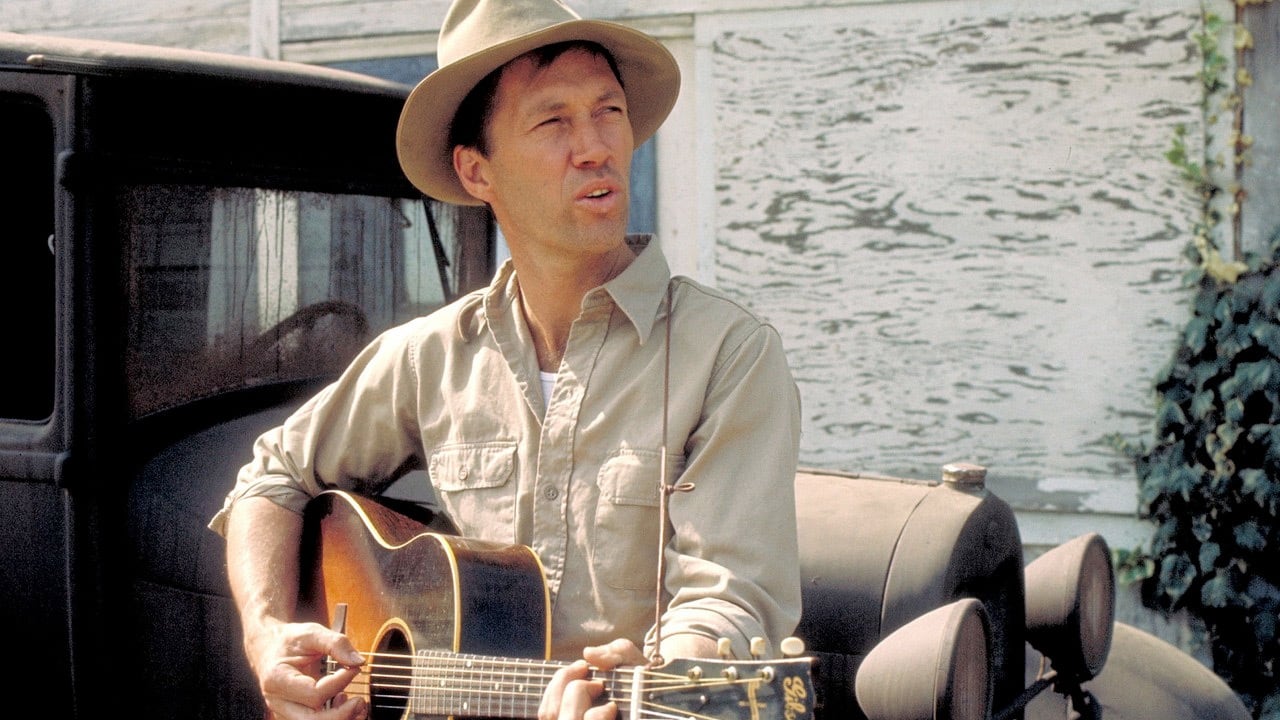

It is 1936 in Pampa, Texas during the oppressive Dust Bowl. Work is hardly available, even for 24 year-old sign-painter Woody Guthrie (David Carradine), who doesn't seem to mind as he spends time with his friends and singing and playing the guitar. Woody's first wife, long-suffering Mary (Melinda Dillon), is most concerned about the lack of cash for the growing family (two little girls thus far). After a dust storm strikes, Woody simply packs up and heads for California, where jobs are supposedly plentiful. He leaves a note for Mary, "Going to California. Will send for you all." Constantly struck with wanderlust (as we shall see), Woody is really a drifter. So Woody, along with many hobos of the Great Depression, hitchhikes and rides the rails on his journey. By the way, this is the largest migration in US history. Along the way Woody lives in migrant worker camps and "Hoovervilles." Along his travels he meets all kinds of characters, including Slim Snedeger (Ji-Tu Cumbuka) and unionizing folk singer Ozark Bule (Ronny Cox). At a migrant camp Ozark and Woody sing and extort the workers to unionize until thugs arrive and break up the gathering. As Woody observes the miserable plight of many Americans, his social conscience is so raised that he composes and sings many of his folk songs. Note the memorable scene atop a boxcar where Woody plunks away at his guitar while he composes the words to "This Land Is Your Land." Later on there is another set where Woody waltzes into a factory and exhorts the workers to unionize; he is promptly beaten up by security folks. Ozark Bule helps Woody to get a radio job at KTNS for twenty dollars a week. Most of the mail from listeners is positive, and Woody and singing partner Memphis Sue (Melinda Dillon again) get an offer of thirty-five dollars weekly. Station manager Locke (John Lehne), concerned about his new sponsors, tells Woody not to sing any controversial songs. After all, the sponsors pay for what they want to hear, and they do not want provocative subject matter. But there really is no compromise for Woody. Note that this scene is really inaccurate, as Woody was really advocating support of the Soviet Union. (Then when Russia's Stalin signed the August 1939 non-aggression pact with Nazi Germany, the leftists were stunned and . . . Oh, never mind!)An agent, Baker (Bernie Kopell), plans on getting Woody an offer to play for CBS as long as his songs are not controversial. No thanks! And as there is no middle ground, it is time for the detached Woody to move on. Ultimately Woody will work his way to New York where there are many people and unions who will hear the message of his music. Woody is destined to gain even greater acclaim than previously. The movie focus is on a slice of Woody's life (1936-1940), loosely based upon his 1943 autobiography. The famous folk singer-songwriter and musician is flawed and neglectful of his family, even after he relocates them to California. Although married, he was a notorious womanizer. In his real life the detached Woody had three wives and seven children (son Arlo was not born until 1947). But Woody inspired folks who had nothing except hope; he said one's skin color is not important. Despite his defects he remained idealistic and gave up various monetary offers. Still, he was not an easy man to live with. The songs, performed by David Carradine, include "This Train Is Bound for Glory," "Talking Dust Bowl Blues," "I Ain't Got No Home," and of course the famous "This Land Is Your Land." The feature may be slow-paced, but there are also impressive golden-colored cinematography and scenic views. There are also authentic and stunning period details, like the shabby frame houses and jalopies. The acting is natural; Carradine is very good as the folk singer who never surrenders his deeply felt convictions. In fact in this movie Carradine is Woody. "Bound for Glory" received an Oscar nomination for Best Picture, but understandably lost out to "Rocky," a "top 100 of all time" movie.
... View MoreTill I saw this movie, I always viewed 'folk music' as tree hugging save the world hippy happy tunes. But from this movie I now understand the emphasis on 'folk'. And really it's not too different from 'punk'. Woody sang about the people he was singing to. Hardships and hopes. Decency before profit. And how great America is, even when America wasn't doing so great. Hal Ashby put's a 'grit' not only into, but onto the film. I could literally feel the dust and grime on me as I watched. And say what you will about David Carradine being a cantankerous S.O.B., but he was cast and played Woody perfectly. To steal a line from Dr. Strangelove - "Woody is a man of the people. But he's also a 'man', if you follow my meaning..." And Ronny Cox I thought was stellar in his performance. All in all, the movie gives me great appreciation for the depiction of Woody, the depression era, and the unsung brilliance of Hal Ashby and the cast. A must have for anyone that's into music, sociology, history, and/or just great film making!
... View MoreThis biopic starts in 1936. Woody Guthrie (David Carradine) is struggling in the dusty small town of Pampa, Texas with his wife Mary (Melinda Dillon). Jobs are hard to find and everybody is looking to leave for California. He runs off to ride the rails and becomes one of the most influential folk singers.This is limited in excitement and tension. It's a quiet easy movie. It's quietness takes away some of the emotions in the movie. David Carradine is putting in a simple nice guy performance. There are some inventive camera work using the new steadycam. The look of the movie is one of faded dusty postcard. It's a pretty and interesting movie to look but it's not much more than that. It's a long winding road.
... View MoreForget 'the grasshopper' guy. Carradine outperformed himself and showed he was truly his father's son. The way he responded to the bullying and attempts to package him were great. However, he must have interacted or found a way or an agent to interact with the music business enough to get his music known all over the world.The expressions on his face as he listens to the humiliating demands of the show business people mirror the attitudes of the thugs who were trying to get him to stay away from the workers as he tried to unionize them. So much of this is true today, where the media are forced to tell only the 'news' the corporations want out there in our own National Pravda. Actually, the coercion is so profound in this country that either you wouldn't even get hired if you were detected as a liberal, or you would be forced to read the managed news the network prostitutes had written.As our country becomes more and more corrupt, you can't help but love these movies where Americans actually trusted one another. Woody asks to borrow the worker's car and he says, "Sure, will you come back?" And Woody says, "That's where I've got to sleep." Which isn't an answer as he could steal the truck and still sleep in it on the other side of the country.The sight of the railroad goons shooting the guy at the moment he's so exhilarated about getting into L.A. was quite a surprise. YOu really expected that to happen at the beginning of Woodie's riding the rails experience, when they lined all those folks up, women and men, and threatened them.And we're heading for those rough times again, as people begin to wake up from the lies the corporate media have told us about the 'bailout'. At least Rolling Stone has it right: we gave the money to the banks, and it was like giving the bankers an ATM account into the taxpayers pocket. Of course, we'll never see that money again. The bankers and their Congressional goons/whores will see to that. This movie was about a similar time in our country's history.It is too bad that his own family had to suffer from his wanderings. Although his wife was a nag, one can't blame her. Wonder if Arlo has ever opened up about that, since effectively he chose a very similar lifestyle to his father.Despite the bad review I read in "The Thousand Best Movies Ever Made", this was a beautifully made film.And in fact, the book itself is quite funny as much of the reviews pan the movies that are 'the best'!!!!! Rent it. Buy it. It gives you a lot about our country to remember and love, even if it's gone forever. Unions forever!!! Organize or the middle class is dead; and so I do what Woody got fired from the station for doing: speak of something controversial that will irritate our corporate 'massas'.
... View More